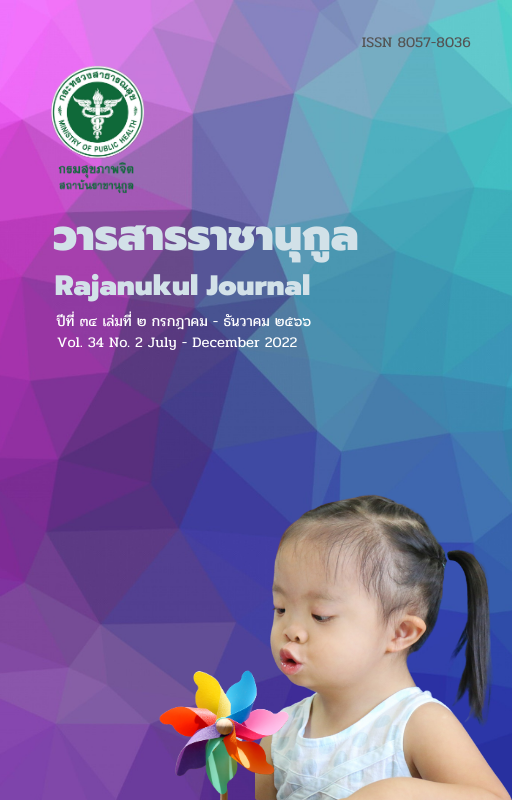การพัฒนาแบบวัดสุขภาวะทางจิต (Psychological Well-Being Scale-PWBS) ฉบับภาษาไทย
คำสำคัญ:
สุขภาวะทางจิต , แบบวัดทางจิตวิทยา, การแปลย้อนกลับบทคัดย่อ
วัตถุประสงค์ เพื่อแปลแบบวัดสุขภาวะทางจิต (Psychological Well-Being Scale-PWBS) จากภาษาอังกฤษเป็นฉบับภาษาไทย และทดสอบความตรงและความเชื่อมั่นของแบบวัดสุขภาวะทางจิตฉบับภาษาไทย
วัสดุและวิธีการ การวิจัย Validity study ในกลุ่มตัวอย่าง 122 คน เป็นประชาชนไทย อายุ 14-60 ปี อ่านเขียนหนังสือภาษาไทยได้ ไม่มีประวัติการเจ็บป่วยทางจิตเวช เก็บข้อมูลความตรงและความเที่ยงด้วยแบบสอบถามข้อมูลทั่วไป ดัชนีวัดความสุขคนไทย และแบบวัดสุขภาวะทางจิตฉบับภาษาไทย วิเคราะห์ข้อมูลทั่วไปด้วยสถิติเชิงพรรณนา และวิเคราะห์ความตรงด้วย Pearson Correlation และวิเคราะห์ความเที่ยงด้วย Cronbach’s alpha
ผล ความตรง (Concurrent validity) ของแบบวัดสุขภาวะทางจิตฉบับภาษาไทยทั้งฉบับ เท่ากับ .510 และองค์ประกอบย่อยแบบวัดสุขภาวะทางจิตฉบับภาษาไทย ด้าน 1) เป็นตัวของตัวเอง (Autonomy) 2) ปรับตัวต่อสิ่งแวดล้อม (Environment mastery) 3) พัฒนาตนเอง (Personal Growth) 4) สัมพันธภาพทางบวก (Positive relationship with others) 5) จุดมุ่งหมายในชีวิต (Purpose in life) และ 6) ยอมรับตนเอง (Self-acceptance) เทียบกับดัชนีชี้วัดความสุขคนไทย เท่ากับ .289, .414, .380, .395, .479, .488 ตามลำดับ ความเที่ยง (Reliability) ของแบบวัดสุขภาวะทางจิตฉบับภาษาไทยทั้งฉบับ เท่ากับ .901และองค์ประกอบย่อยรายแบบวัดสุขภาวะทางจิตฉบับภาษาไทย 1) เป็นตัวของตัวเอง (Autonomy) 2) ปรับตัวต่อสิ่งแวดล้อม (Environment mastery) 3) พัฒนาตนเอง (Personal Growth) 4) สัมพันธภาพทางบวก (Positive relationship with others) 5) จุดมุ่งหมายในชีวิต (Purpose in life) และ 6) ยอมรับตนเอง (Self-acceptance) เท่ากับ .470, .622, .643, .674, .516, .760 ตามลำดับ
สรุป แบบวัดสุขภาวะทางจิตฉบับภาษาไทยมีความตรงเท่ากับ .510 และมีความเที่ยงเท่ากับ .901
เอกสารอ้างอิง
Fava GA. Well-Being Therapy: Treatment Manual and Clinical Applications. German: KARGER; 2016.
Ruini C, Fava GA.Clinical Applications of Well-Being Therapy. In Linley PA, Joseph S, editors.Positive psychology in practice. John Wiley & Sons, Inc; 2004. p. 371–87.
Ryff CD. Psychological Well-Being Revisited: Advances in the Science and Practice of Eudaimonia. psychotheerapy and Psychosomatics 2014;83:10-28. doi:10.1159/000353263
Ryff CD. Happiness is everything, or is it? Explorations on the meaning of psychological well-being. Journal of Personality and Social Psychology 1989;57(6):1069-81. doi:10.1037/0022-3514.57.6.1069
Ryff CD. 14-items handout of Psychological Well-Being Scale. Institute on Aging. . University of Wisconsin.US.;2012.
ICPSR. MIDUS projects. 2016 [cited 2016 May 20]. Available from: https://www.icpsr.umich.edu/web/ICPSR/studies/37095
Warupsorn R. The effect of personal growth group on psychological well-being of the elderly. (Master). Bangkok: Chulalongkorn University;2006.
Ryff CD, Keyes C. The Structure of Psychological Well-Being Revisited. Journal of Personality and Social Psychology 1995;69:719-727. doi:10.1037/0022-3514.69.4.719
Chan D, Chan L, Sun I. Developing a Brief Version of Ryff’s Scale to Assess the Psychological Well-Being of Adolescents in Hong Kong. European Journal of Psychological Assessment 2017;35:1-9.
อาภากร เปรี้ยวนิ่ม, พูลพงศ์ สุขสว่าง, ปิยะทิพย์ ประดุจพรม. การพัฒนามาตรวัดความผาสุกทางจิต. วารสารพยาบาล 2563;69(2):30-36.
Chaleeraktrakoon T, Taesilapasathit C. Family influence on career choices as a predictor for psychological well-being of Thai university students. Journal of Liberal Arts, Thammasat University 2022;22(2):300-315. doi:10.14456/lartstu.2022.24
Beaton DE, Bombardier CF, Ferraz MB. Guidelines for the Process of Cross-Cultural Adaptation of Self-Report Measures. SPINE 2000; 25(24):3186-91.
Cha ES, Kim KH, Erlen JA. Translation of scales in cross-cultural research: issues and techniques. Journal of Advanced Nursing 2007;58(4):386-95.
Chan TSF, Lam LCW, Chiu HFK. Validation of the Chinese version of the Zarit Burden Interview. Hong Kong Journal of Psychiatry 2005;15(1):9-13.
Sawasdipanich N, Tiansawad S. Instrument Translation for Cross-Cultural Research: Technique and Issues to be considered. Thai Journal of Nursing Council 2011;26(2):19-28.
Silpakit O, Silpakit C, Chomchuen R. Psychometric study of the Thai version of Zarit Burden Interview in psychiatric caregivers. Journal of Mental Health of Thailand 2015;23(1):12-23.
Tang JY, Ho AH, Luo H, Wong GH, Lau BH, Lum TY, et al. Validating a Cantonese short version of the Zarit Burden Interview (CZBI-Short) for dementia caregivers. Aging Ment Health 2016;20(9):996-1001.
Uakarn C, Chaokromthong K, Sintao N. Sample Size Estimation using Yamane and Cochran and Krejcie and Morgan and Green Formulas and Cohen Statistical Power Analysis by G*Power and Comparisons. APHEIT INTERNATIONAL JOURNAL 2021;10(2):76-88.
วัลลภ รัฐฉัตรานนท์. การหาขนาดตัวอย่างที่เหมาะสมสาหรับการวิจัย: มายาคติในการใช้สูตรของทาโรยามาเน่และเครทซี-มอร์แกน. วารสารสหวิทยาการวิจัย 2562 ฉบับบัณฑิตศึกษา; 8(1),11-28.
กรมสุขภาพจิต. ดัชนีชี้วัดความสุขคนไทย Thai Happiness Indicators (THI-15). [อินเตอร์เน็ต].2545 เข้าถึงได้จาก: https://www.dmh.go.th/test/download/files/thi15.pdf
ดาวน์โหลด
เผยแพร่แล้ว
รูปแบบการอ้างอิง
ฉบับ
ประเภทบทความ
สัญญาอนุญาต
ลิขสิทธิ์ (c) 2023 Yada Thongthammarat

อนุญาตภายใต้เงื่อนไข Creative Commons Attribution-NonCommercial-NoDerivatives 4.0 International License.
ข้าพเจ้าและผู้เขียนร่วม (ถ้ามี) ขอรับรองว่า ต้นฉบับที่เสนอมานี้ยังไม่เคยได้รับการตีพิมพ์และไม่ได้อยู่ในระหว่างกระบวนการพิจารณาตีพิมพ์ลงในวารสารหรือสิ่งตีพิมพ์อื่นใด ข้าพเจ้าและผู้เขียนร่วม (ถ้ามี) ยอมรับหลักเกณฑ์และเงื่อนไขการพิจารณาต้นฉบับ ทั้งยินยอมให้กองบรรณาธิการมีสิทธิ์พิจารณาและตรวจแก้ต้นฉบับได้ตามที่เห็นสมควร พร้อมนี้ขอมอบลิขสิทธิ์ผลงานที่ได้รับการตีพิมพ์ให้แก่วารสารราชานุกูล กรณีมีการฟ้องร้องเรื่องการละเมิดลิขสิทธิ์เกี่ยวกับภาพ กราฟ ข้อความส่วนใดส่วนหนึ่ง หรือ ข้อคิดเห็นที่ปรากฏในผลงาน ให้เป็นความรับผิดชอบของข้าพเจ้าและผู้เขียนร่วม (ถ้ามี) แต่เพียงฝ่ายเดียว และหากข้าพเจ้าและผู้เขียนร่วม (ถ้ามี) ประสงค์ถอนบทความในระหว่างกระบวนการพิจารณาของทางวารสาร ข้าพเจ้าและผู้เขียนร่วม (ถ้ามี) ยินดีรับผิดชอบค่าใช้จ่ายทั้งหมดที่เกิดขึ้นในกระบวนการพิจารณาบทความนั้น






